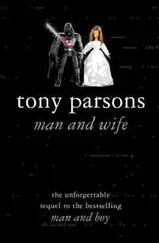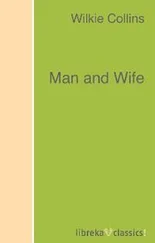Уилки Коллинз - Man and Wife
Здесь есть возможность читать онлайн «Уилки Коллинз - Man and Wife» — ознакомительный отрывок электронной книги совершенно бесплатно, а после прочтения отрывка купить полную версию. В некоторых случаях можно слушать аудио, скачать через торрент в формате fb2 и присутствует краткое содержание. Год выпуска: 2006, Жанр: Классическая проза, на английском языке. Описание произведения, (предисловие) а так же отзывы посетителей доступны на портале библиотеки ЛибКат.
- Название:Man and Wife
- Автор:
- Жанр:
- Год:2006
- ISBN:нет данных
- Рейтинг книги:3 / 5. Голосов: 1
-
Избранное:Добавить в избранное
- Отзывы:
-
Ваша оценка:
- 60
- 1
- 2
- 3
- 4
- 5
Man and Wife: краткое содержание, описание и аннотация
Предлагаем к чтению аннотацию, описание, краткое содержание или предисловие (зависит от того, что написал сам автор книги «Man and Wife»). Если вы не нашли необходимую информацию о книге — напишите в комментариях, мы постараемся отыскать её.
Man and Wife — читать онлайн ознакомительный отрывок
Ниже представлен текст книги, разбитый по страницам. Система сохранения места последней прочитанной страницы, позволяет с удобством читать онлайн бесплатно книгу «Man and Wife», без необходимости каждый раз заново искать на чём Вы остановились. Поставьте закладку, и сможете в любой момент перейти на страницу, на которой закончили чтение.
Интервал:
Закладка:
“Did she give a name?”
“I can’t be quite sure—I should say not.”
“Did the gentleman give a name?”
“No. I’m certain he didn’t.”
Sir Patrick returned to the memorandum.
“‘He said at dinner, before the landlady and the waiter, I take these rooms for my wife. He made her say he was her husband, at the same time.’ Was that done jocosely, Mr. Delamayn—either by the lady or the gentleman?”
“No. It was done in downright earnest.”
“You mean it was done to look like earnest, and so to deceive the landlady and the waiter?”
“Yes.”
Sir Patrick returned to the memorandum.
“‘After that, he stopped all night.’ Stopped in the rooms he had taken for himself and his wife?”
“Yes.”
“And what happened the next day?”
“He went away. Wait a bit! Said he had business for an excuse.”
“That is to say, he kept up the deception with the people of the inn? and left the lady behind him, in the character of his wife?”
“That’s it.”
“Did he go back to the inn?”
“No.”
“How long did the lady stay there, after he had gone?”
“She staid—well, she staid a few days.”
“And your friend has not seen her since?”
“No.”
“Are your friend and the lady English or Scotch?”
“Both English.”
“At the time when they met at the inn, had they either of them arrived in Scotland, from the place in which they were previously living, within a period of less than twenty-one days?”
Geoffrey hesitated. There could be no difficulty in answering for Anne. Lady Lundie and her domestic circle had occupied Windygates for a much longer period than three weeks before the date of the lawn-party. The question, as it affected Arnold, was the only question that required reflection. After searching his memory for details of the conversation which had taken place between them, when he and Arnold had met at the lawn-party, Geoffrey recalled a certain reference on the part of his friend to a performance at the Edinburgh theatre, which at once decided the question of time. Arnold had been necessarily detained in Edinburgh, before his arrival at Windygates, by legal business connected with his inheritance; and he, like Anne, had certainly been in Scotland, before they met at Craig Fernie, for a longer period than a period of three weeks He accordingly informed Sir Patrick that the lady and gentleman had been in Scotland for more than twenty-one days—and then added a question on his own behalf: “Don’t let me hurry you, Sir—but, shall you soon have done?”
“I shall have done, after two more questions,” answered Sir Patrick. “Am I to understand that the lady claims, on the strength of the circumstances which you have mentioned to me, to be your friend’s wife?”
Geoffrey made an affirmative reply. The readiest means of obtaining Sir Patrick’s opinion was, in this case, to answer, Yes. In other words, to represent Anne (in the character of “the lady”) as claiming to be married to Arnold (in the character of “his friend”).
Having made this concession to circumstances, he was, at the same time, quite cunning enough to see that it was of vital importance to the purpose which he had in view, to confine himself strictly to this one perversion of the truth. There could be plainly no depending on the lawyer’s opinion, unless that opinion was given on the facts exactly a s they had occurred at the inn. To the facts he had, thus far, carefully adhered; and to the facts (with the one inevitable departure from them which had been just forced on him) he determined to adhere to the end.
“Did no letters pass between the lady and gentleman?” pursued Sir Patrick.
“None that I know of,” answered Geoffrey, steadily returning to the truth.
“I have done, Mr. Delamayn.”
“Well? and what’s your opinion?”
“Before I give my opinion I am bound to preface it by a personal statement which you are not to take, if you please, as a statement of the law. You ask me to decide—on the facts with which you have supplied me—whether your friend is, according to the law of Scotland, married or not?”
Geoffrey nodded. “That’s it!” he said, eagerly.
“My experience, Mr. Delamayn, is that any single man, in Scotland, may marry any single woman, at any time, and under any circumstances. In short, after thirty years’ practice as a lawyer, I don’t know what is not a marriage in Scotland.”
“In plain English,” said Geoffrey, “you mean she’s his wife?”
In spite of his cunning; in spite of his self-command, his eyes brightened as he said those words. And the tone in which he spoke—though too carefully guarded to be a tone of triumph—was, to a fine ear, unmistakably a tone of relief.
Neither the look nor the tone was lost on Sir Patrick.
His first suspicion, when he sat down to the conference, had been the obvious suspicion that, in speaking of “his friend,” Geoffrey was speaking of himself. But, like all lawyers, he habitually distrusted first impressions, his own included. His object, thus far, had been to solve the problem of Geoffrey’s true position and Geoffrey’s real motive. He had set the snare accordingly, and had caught his bird.
It was now plain to his mind—first, that this man who was consulting him, was, in all probability, really speaking of the case of another person: secondly, that he had an interest (of what nature it was impossible yet to say) in satisfying his own mind that “his friend” was, by the law of Scotland, indisputably a married man. Having penetrated to that extent the secret which Geoffrey was concealing from him, he abandoned the hope of making any further advance at that present sitting. The next question to clear up in the investigation, was the question of who the anonymous “lady” might be. And the next discovery to make was, whether “the lady” could, or could not, be identified with Anne Silvester. Pending the inevitable delay in reaching that result, the straight course was (in Sir Patrick’s present state of uncertainty) the only course to follow in laying down the law. He at once took the question of the marriage in hand—with no concealment whatever, as to the legal bearings of it, from the client who was consulting him.
“Don’t rush to conclusions, Mr. Delamayn,” he said. “I have only told you what my general experience is thus far. My professional opinion on the special case of your friend has not been given yet.”
Geoffrey’s face clouded again. Sir Patrick carefully noted the new change in it.
“The law of Scotland,” he went on, “so far as it relates to Irregular Marriages, is an outrage on common decency and common-sense. If you think my language in thus describing it too strong—I can refer you to the language of a judicial authority. Lord Deas delivered a recent judgment of marriage in Scotland, from the bench, in these words: ‘Consent makes marriage. No form or ceremony, civil or religious; no notice before, or publication after; no cohabitation, no writing, no witnesses even, are essential to the constitution of this, the most important contract which two persons can enter into.’—There is a Scotch judge’s own statement of the law that he administers! Observe, at the same time, if you please, that we make full legal provision in Scotland for contracts affecting the sale of houses and lands, horses and dogs. The only contract which we leave without safeguards or precautions of any sort is the contract that unites a man and a woman for life. As for the authority of parents, and the innocence of children, our law recognizes no claim on it either in the one case or in the other. A girl of twelve and a boy of fourteen have nothing to do but to cross the Border, and to be married—without the interposition of the slightest delay or restraint, and without the slightest attempt to inform their parents on the part of the Scotch law. As to the marriages of men and women, even the mere interchange of consent which, as you have just heard, makes them man and wife, is not required to be directly proved: it may be proved by inference. And, more even than that, whatever the law for its consistency may presume, men and women are, in point of fact, held to be married in Scotland where consent has never been interchanged, and where the parties do not even know that they are legally held to be married persons. Are you sufficiently confused about the law of Irregular Marriages in Scotland by this time, Mr. Delamayn? And have I said enough to justify the strong language I used when I undertook to describe it to you?”
Читать дальшеИнтервал:
Закладка:
Похожие книги на «Man and Wife»
Представляем Вашему вниманию похожие книги на «Man and Wife» списком для выбора. Мы отобрали схожую по названию и смыслу литературу в надежде предоставить читателям больше вариантов отыскать новые, интересные, ещё непрочитанные произведения.
Обсуждение, отзывы о книге «Man and Wife» и просто собственные мнения читателей. Оставьте ваши комментарии, напишите, что Вы думаете о произведении, его смысле или главных героях. Укажите что конкретно понравилось, а что нет, и почему Вы так считаете.








